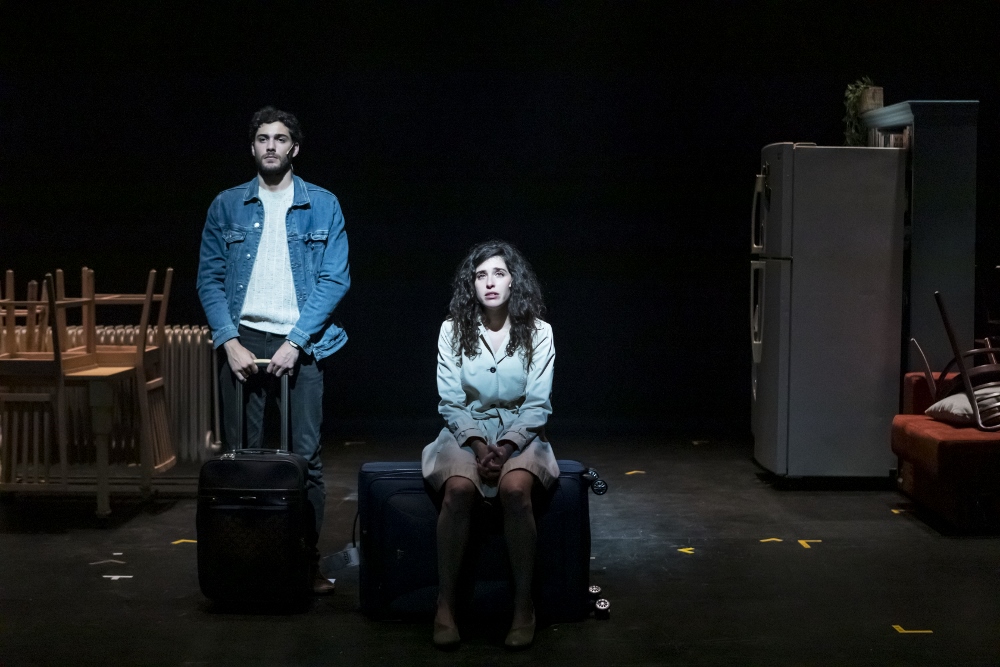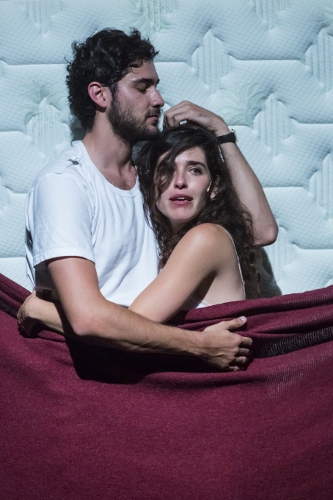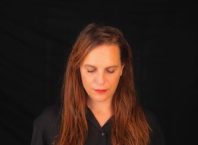
All the Rivers is a love story – the Cameri production captures the exhilaration, tenderness, and passion of an intense love. Drawing on the time-honored theme of forbidden love, the play, written by Noga Ashkenazi, and directed by Ilan Ronen, is based on Dorit Rabinyan’s eponymous novel, and depicts the relationship that develops between Liat Binyamini, a Jewish Israeli woman, and Hilmi Nasser, a Palestinian from Ramallah. At the time, when the novel was published in Israel in 2014 (an English translation came out in 2017), it raised controversy and dramatically different responses from readers – rejected by the Education Ministry for high school reading lists, it became an instant best-seller. In approaching these themes, the play is taking on a very complex and loaded issue. Yet first and foremost, All the Rivers is a love story.
Recovering from a painful breakup, Liat Binyamini arrives in New York with a scholarship to study Comparative Literature. It’s an opportunity to leave the past behind and make a fresh start. Avigail Harari delivers an endearing and genuine portrayal of Liat as a sensitive, intelligent, vivacious young woman at a time in her life when she is trying to be open to new experiences, and even take a risk or two. Hilmi Nasser is an artist who has been living in Brooklyn for five years. Amir Khoury’s portrayal of Hilmi – a sweet, thoughtful, dreamer with a mischievous sense of humor – is so irresistibly charming that it is no surprise that he sweeps Liat off her feet, and elicits the audience’s affections as well. The connection between the two is electrifying, they are the embodiment of love, in all its youthful fervor.

The play is set in 2002, a significant time in Israeli and US history – New York is still reeling from the impact of 9/11, and Israel was going through the Second Intifada. These issues are always present, whether in the background, or as part of the plot. There is a nice balance between humor and gravity in the play’s relationship to these themes; they never overwhelm yet they are ever-present, often with a knowing wink. The humor is a necessary and welcome aspect of the play, the political aspect is so volatile and divisive, that it makes it exceptionally challenging to depict a relationship between a Jewish Israeli woman and a Palestinian man. Keeping the mood light prevents the play from becoming mired down in politics, and keeps the focus on the characters and relationship. Humor provides a perspective from which to view the inherent complexities of the situation.
The play’s staging is lively and inventive, setting the tone for the action. An empty stage symbolizes the endless possibilities of coming to a new place, where anything can happen, and the use of animation emphasizes the dreamy, imaginative aspect. The stage crew become part of the play, bringing objects on and off stage, changing the scene and infusing the action with quirky humor – handing Liat her coat, or nodding in time to the music. Their physical presence onstage, as well as the presence of Iris, Liat’s sister, during their phone calls, performs another significant function as well. Liat and Hilmi’s relationship is possible because their location places them physically far from the Israeli-Palestinian conflict, and therefore are able to disconnect from that conflict in their thoughts and feelings. Yet the physical presence of the other actors – Iris during phone calls or in Liat’s thought processes, and those carrying objects – is a reminder that ultimately, they are never really alone. Their relationship cannot be considered without taking into account the context of family, religion, politics, and the Israeli-Palestinian conflict.
It’s a challenge to navigate these themes, and I felt that the play’s symbolism, with Hilmi’s relationship to water and the color blue, while evocative, also reinforced certain stereotypes, which I felt detracted from the total effect. Inevitably, given the vast proportions of the issues involved, the politics did feel rather heavy at times, and towards the latter part of the play, certain small transitions felt somewhat fast and forced.
The play has many strengths – its theatrical language is creative and appealing, with captivating performances from Harari and Khoury, and an engaging ensemble of supporting actors. There is a sense of authenticity in the scenes of Israelis in New York, and the experience of being far from home, conveying Liat’s thrill at the freedom to reinvent herself, the desire to distance herself from all that is difficult to acknowledge – the discrimination against Arabs, the occupation – and at the same time, the feeling of belonging and comfort in familiar rituals and traditions, like singing Shabbat songs at Friday night dinner. All the Rivers conveys the emotional truth of its characters, as they meet and fall in love, with a connection that reaches beyond borders and politics. Yet it also conveys the barriers to their love: the enduring connection that each has to family, community, language, culture, history, and the perspective created by those connections.
All the Rivers
By Noga Ashkenazi, based on the novel by Dorit Rabinyan
Directed by Ilan Ronen; Set: Shani Tur; Costumes: Ula Shevzov; Music: Daniel Salomon; Lighting: Nadav Barnea; Video: Yoav Cohen; Cast: Avigail Harari, Amir Khoury, Moran Arbiv Gans, Tal Weiss, Morad Hassan, Shoham Sheiner, Shani Shauli





